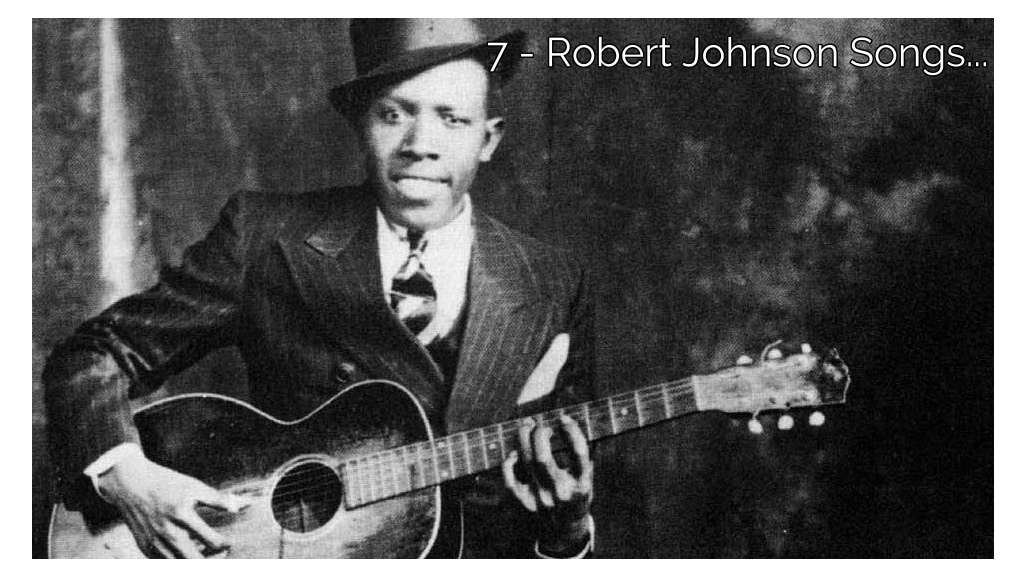-
 play_arrow
play_arrow
Praise 24/7 NO Today's Best Gospel
7 Robert Johnson Songs That Changed Music Forever: A Blues Legend’s Must-Listens.

(ThyBlackMan.com) There’s something about Robert Johnson’s music that grabs you by the soul and doesn’t let go. Maybe it’s the rasp in his voice, the haunted slide of his guitar, or the way his lyrics sound like confessions whispered through time. For me, discovering Johnson was like finding the roots beneath the roots—realizing that so much of the music I love today grew out of his pain, passion, and poetry.
What’s wild is that Johnson only recorded 29 songs in a short life that ended far too early, but those tracks echo louder than some entire catalogs. His blues aren’t just sad songs—they’re spiritual crossroads, emotional reckonings, and raw truths wrapped in rhythm. These seven songs aren’t just a greatest hits list—they’re a journey through his soul, and maybe even a mirror for ours. Whether you’re deep into blues or just curious about where rock, soul, and hip-hop trace their DNA, Robert Johnson is where you start.

1. “Cross Road Blues”
“Cross Road Blues” isn’t just one of Johnson’s most famous songs—it’s the cornerstone of blues mythology. With its spectral slide guitar and agonized vocals, this track has become symbolic of the so-called “deal with the devil” legend that clings to Johnson’s legacy. The crossroads, in African-American folklore, is a place of spiritual tension, and Johnson transforms that tension into art. His voice quivers with a vulnerability that’s palpable, pleading not just for a ride, but for some form of salvation.
Musically, “Cross Road Blues” is urgent and taut. Johnson’s guitar work is nimble, switching between rhythmic slaps and mournful moans of bottleneck slide. It’s the kind of sound that feels both ancient and shockingly alive. There’s desperation in every note—he’s not just singing about being stranded, he’s capturing the loneliness of spiritual exile. His cries to “please don’t drive me down” echo with the fear of invisibility, of being left behind in a world that’s moving too fast. There’s a timeless quality to the tension—an inner scream that listeners across generations can understand.
Modern listeners can appreciate this song not just as a dusty relic of pre-war blues, but as a masterclass in minimalism and emotional storytelling. It’s been reimagined by everyone from Cream to John Mayer, but none carry the authentic dread and divine drama like Johnson. His delivery is the opposite of theatrical—it’s chilling because it feels real. In 2025, “Cross Road Blues” still sounds like a man alone against fate—and that’s universal. Whether heard in a college dorm, a vinyl bar, or a playlist curated for nighttime introspection, it’s a track that continues to confront the listener with the existential weight of choice, regret, and consequence.
2. “Hellhound on My Trail”
Perhaps the most terrifyingly poetic song in Johnson’s catalog, “Hellhound on My Trail” is a chilling descent into paranoia and torment. The image of being chased by a demonic dog isn’t just a metaphor—it’s an encapsulation of Johnson’s inner darkness. Sung in a trembling falsetto, the song is a cry from a man haunted, not just by literal demons, but by guilt, sin, and a life spiraling into shadow. It’s blues as horror, not in spectacle, but in psychological realism—one of the earliest examples of trauma turned into artistic truth.
The pacing of the track is sluggish and spectral. Johnson’s slide guitar feels like a whisper from the grave, its eerie bends giving life to the ghosts he sings about. There’s almost a trance-like repetition to the song, like a man running in circles, unable to escape. His voice doesn’t rise in protest—it wavers in terror, as if he’s already been caught but hasn’t accepted it yet. There’s also a harrowing loneliness in lines like “I can tell the wind is risin’, the leaves tremblin’ on the tree.” Nature itself seems to mimic the anxiety in his bones.
“Hound” remains relevant not just for its gothic imagery, but for its visceral honesty. In a time where mental health discussions are front and center, Johnson’s lament reads like a man aware of his descent. It’s not performative—it’s raw blues therapy. Listening to it today reminds us how Johnson, long before confessional songwriting became trendy, laid his entire soul bare on the record. He didn’t try to be brave—he just told the truth. And in 2025, when so many songs are polished for perfection, this cracked, imperfect howl from the past hits with staggering force.
3. “Love in Vain”
“Love in Vain” is the kind of blues ballad that breaks your heart quietly. There’s no anger or betrayal here—just the crushing melancholy of unrequited love. Johnson’s vocals are stripped of bravado; he sounds empty, like someone who has already accepted that the train taking his love away will never return. This is the blues not as rebellion, but as resignation. His emotions are laid bare, yet they’re not shouted—they’re murmured in despair, like a man talking to himself when no one else is around.
The guitar accompaniment is delicate, restrained. You can hear the country blues influence in his fingerpicking, almost as if he’s plucking petals off a flower, wondering if she ever loved him at all. The sparse structure gives Johnson’s voice space to breathe—and bleed. This song lives in the silences between the words as much as in the words themselves. His delivery feels like he’s walking away slowly, each note a step further from hope. The “train pulled out” line isn’t just about literal departure—it’s about finality, the moment you realize love doesn’t always return.
Covered memorably by The Rolling Stones, “Love in Vain” continues to resonate in today’s digital age, where ghosting, heartbreak, and romantic disillusionment are just a swipe away. Johnson’s version feels timeless because everyone, at some point, has stood on that metaphorical platform watching someone leave, knowing deep down they’re not coming back. In a world dominated by curated online personas and fleeting hookups, the raw vulnerability of this track is more necessary than ever. It’s the sound of real loss—not cinematic, not dramatic, just deeply, tragically human.
4. “Me and the Devil Blues”
If “Hellhound on My Trail” was haunted, “Me and the Devil Blues” is straight-up possessed. It’s one of the most sinister songs in Johnson’s repertoire, told from the perspective of a man who wakes up with the devil knocking at his door—and invites him in. The lyrics are bold, shocking even today: “You may bury my body / Down by the highway side.” Johnson wasn’t just dabbling in dark imagery—he was living in it. There’s no fear in his delivery, only acceptance. It’s as if he understands that damnation isn’t a punishment—it’s his destiny.
What sets this track apart is Johnson’s fearless confrontation of evil—not as an external force, but as an intimate companion. The devil isn’t an intruder here. He’s a partner. This subversion of spiritual themes was audacious in the 1930s, especially for a Black man in the Jim Crow South. Johnson turns the moral compass upside down, singing from a space where redemption is no longer on the table. It’s blues as confession, blues as possession. And once you enter his soundscape, it’s hard to escape.
The guitar here is complex and feverish, full of eerie vibrato and lightning-fast runs. The song’s pacing feels like a bad dream—relentless, a bit chaotic, but vivid. Johnson doesn’t just sing the blues here—he is the blues: defiant, doomed, and defiled. There’s a punk-like rebellion to this track that predates even the most jaded rock anthems. In a modern context, this song could sit comfortably alongside alternative trap or horrorcore hip-hop. Artists like Kid Cudi, Denzel Curry, or even Nine Inch Nails echo this emotional terrain. It’s a chilling reminder that reckoning with inner demons is as old as the blues itself.
5. “Come On in My Kitchen”
This is Johnson at his most sensual and spiritual. “Come On in My Kitchen” plays like a quiet invitation, but it’s loaded with longing, eroticism, and survival. The kitchen becomes a metaphorical safe space—a sanctuary in a cold, uncaring world. In this house of blues, food and intimacy go hand in hand. Johnson isn’t just offering warmth; he’s pleading for connection. There’s a romantic undertone, but also a primal one—stay with me, because the storm outside is too cruel to face alone.
The slide guitar work here is among Johnson’s best. Smooth, measured, and aching, it creates a soundscape of warmth in the middle of despair. His falsetto dances around the melody like smoke curling in a small room, giving the song its intimate, almost whispered appeal. You don’t just hear this song—you feel it in your chest. There’s no shouting, no wailing. The power is in the restraint, the suggestion. It’s blues as invitation, not performance. It’s quietly devastating.
In today’s era of lo-fi beats and ASMR soundscapes, “Come On in My Kitchen” could easily find a home. It’s the kind of song you play when the rain hits your window, when the night’s too quiet, or when you need to feel understood. Johnson may have recorded it nearly 90 years ago, but the emotional temperature of this track is just right for today’s world. The intimacy it conveys feels contemporary, even cinematic—it could easily soundtrack a late-night scene in an indie film or a meditative interlude on a streaming series. Timeless blues, perfectly steeped in mood and meaning.
Finish story here; 7 Robert Johnson Songs That Changed Music Forever: A Blues Legend’s Must-Listens.
Written by: Black Gospel Radio
Similar posts
-

Praise 24/7 Commercial Free
For every Show page the timetable is auomatically generated from the schedule, and you can set automatic carousels of Podcasts, Articles and Charts by simply choosing a category. Curabitur id lacus felis. Sed justo mauris, auctor eget tellus nec, pellentesque varius mauris. Sed eu congue nulla, et tincidunt justo. Aliquam semper faucibus odio id varius. Suspendisse varius laoreet sodales.
close Top popular

The Science of Happiness – Exploring Factors for Well-Being

Balancing Act: Prioritizing Your Well-Being in a Busy World

Overcoming Procrastination – Strategies for Productivity and Success

Unlocking Hidden Potential – A Guide to Personal Growth

Mindful Living – Cultivating Presence in the Modern Era

CONTACT US
- info@praise247no.com
FOLLOW US
- Praise247NO
- Praise247NO
- Praise247NO
Copyright 2024 Praise247no.com - All Rights Reserved.



Post comments (0)